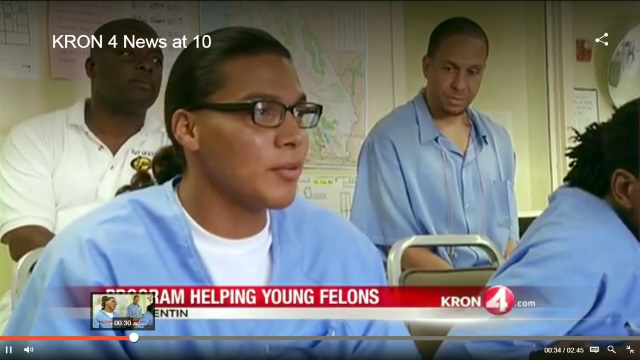When David arrived at San Quentin prison two years ago to serve an 11-year sentence for a crime he committed as a minor, he didn’t expect to find hope or a second chance. But thanks to a department of corrections-sponsored program that gives young prisoners more access to education and rehabilitative programming, David has been given both.
Alecia Reid of KRON-TV 4 in San Francisco reports that just days ago, David graduated his GED class—as the valedictorian. He told his classmates, “You guys motivate and inspire me to do good, and to better myself.” David is now preparing to begin college.
The program that gave David a new sense of optimism and healthy community behind bars is called the Youthful Offender Program (YOP). Through the program, California Department of Corrections and Rehabilitation (CDCR) officials assess incoming prisoners under the age of 22. Those eligible for YOP receive classification at lower security levels, more rehabilitative programming, and safer housing environments.
“I would have been getting into a lot more trouble because of the violence rate that there is in Level III,” David says. Typically, Level II housing provides a dormitory setting rather than cells.
Classmate Jared led a life of crime, beginning when he was just a child. Today, through YOP, he is studying coding. “I program computers and make websites [and] applications for phones,” says Jared, adding that he never expected to be able to do anything like this.
Michael, another participant in San Quentin’s YOP, says spending time in this program showed him that he is a compassionate and loving person, and that his past bad choices don’t have to define who he is today. “I have learned that I have a heart for people,” Michael says.
Currently, 2,300 prisoners at six prisons in California are involved in the Youth Offenders Program, according to a March 2016 article by CDCR Public Information Officer Joe Orlando. He writes that the YOP is gaining momentum and giving incoming young offenders improved opportunities.
Capt. Mike Masters is the program director at California State Prison-Solanas, another of the California institutions offering the YOP. Capt. Masters’ goal, reports Orlando, is to get as many young prisoners into the program as possible.
“If these guys come in at a lower level,” says Capt. Masters, “they’ll get more opportunities for programming, have less stress, and be mentored by those close to the program to provide tools for success.”
Capt. Masters offers words of encouragement for the young men participating in YOP: “There are a lot of people watching you, and pulling for you. We want to see you guys succeed so we can spread the message that this works, and [so] that others can get involved and hopefully turn their lives around.”
If you have a heart for helping young prisoners receive their best chance at restoration—inside and outside prison—please volunteer, donate, or lend your voice in support of laws that support more proportionate sentencing and more constructive prison culture.
